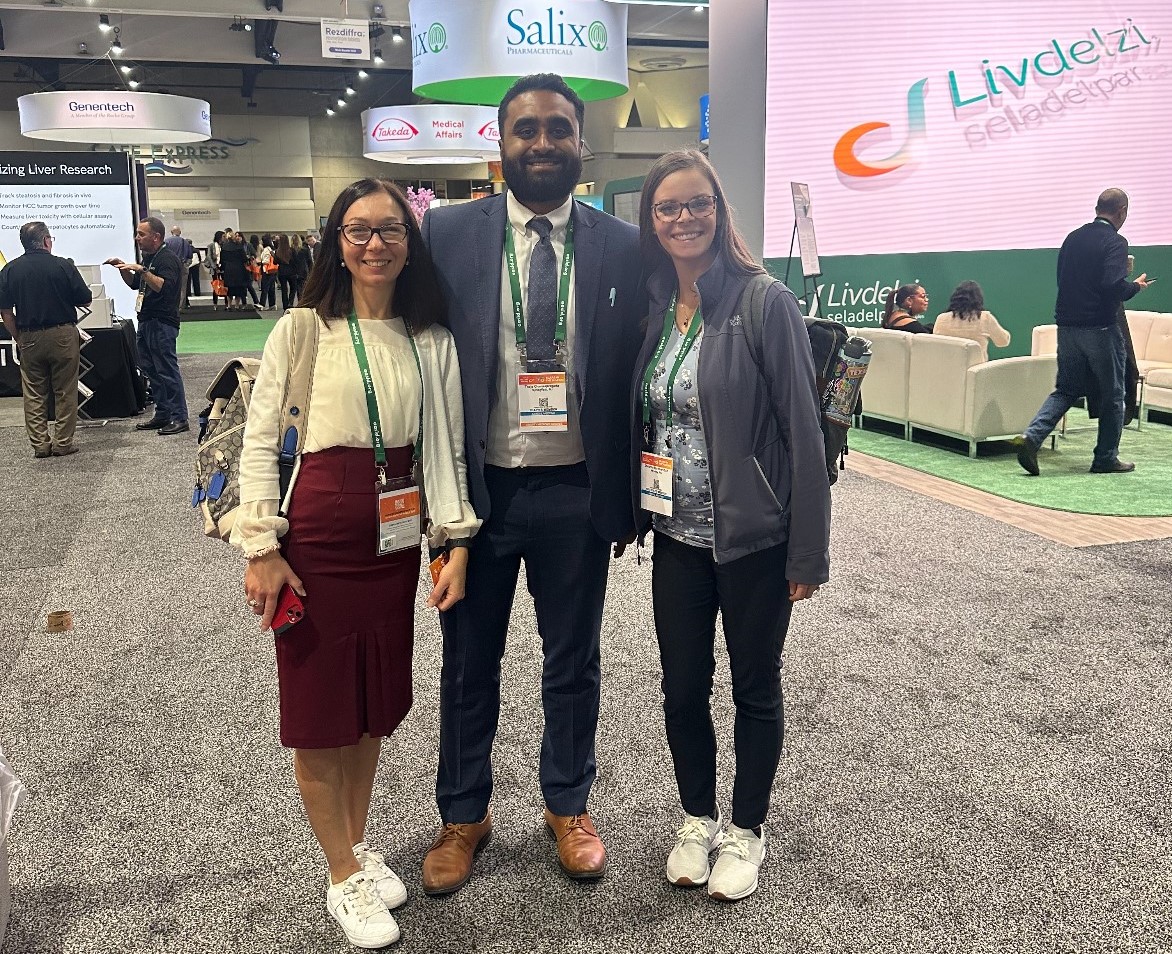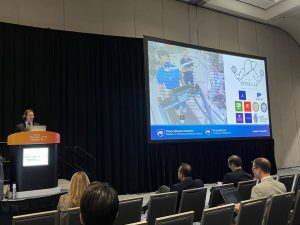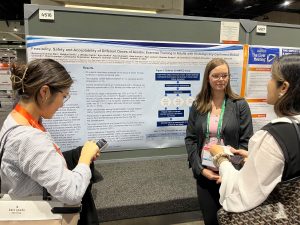College of Medicine hepatology group shines at 75th AASLD liver meeting

The Penn State College of Medicine hepatology team showcased cutting-edge research and leadership at the 75th Annual Meeting of the American Association for the Study of Liver Diseases (AASLD), one of the premier gatherings in the field of hepatology, from Friday, Nov. 15 through Monday, Nov. 18 in San Diego. Across three action-packed days, the team made significant contributions to advancing the understanding and management of liver diseases, particularly metabolic-associated steatohepatitis (MASH) and related conditions.
Saturday Highlights
The meeting kicked off with Dr. Jonathan Stine, associate professor of medicine and public health sciences, attending the prestigious AASLD Foundation Club 1950 Research Luncheon, recognizing groundbreaking contributions to liver research. Later in the day, Dr. Elizabeth Stonesifer, assistant professor of medicine, represented Penn State on the Hepatology Associates Committee, highlighting the importance of advanced practice providers in hepatology care. The day concluded with Dr. Stine attending the AASLD Foundation Reception, fostering collaborations with fellow leaders in the field.
Sunday Sessions
Sunday saw Penn State researchers take center stage. Dr. Stine presented findings from the NASHFit trial during the MASLD Parallel Session, unveiling groundbreaking evidence that aerobic exercise training can resolve MASH, without requiring weight loss. This work – conducted in collaboration with researchers in the Department of Medicine including Dr. Theja Channapragada, second-year internal medicine resident; Dr. Ian Schreibman, professor of medicine; and Dr. Chris Sciamanna, professor of medicine and public health sciences – underscored the transformative role of exercise in liver health.

Dr. Jonathan Stine presents his research lab’s findings in an oral parallel session about how exercise training improves metabolic dysfunction-associated steatotic liver disease (MASLD) without body weight loss.
Later that day, Dr. Stonesifer contributed to the Women’s Initiative through the AASLD, reinforcing the critical need for gender equity in liver health leadership. Dr. Stine is a new member to AASLD Foundation Research Awards Committee, reflecting his commitment to fostering innovation in hepatology. The day wrapped up with his symposium presentation on Controversies in Portal Hypertension, alongside leading experts from Spain and Canada.
Dr. Muhammad Shahzil, second-year internal medicine resident, also presented two abstracts that day, informing on treatment options for hepatocellular carcinoma and also novel therapeutic targets in metabolic dysfunction-associated steatotic liver disease (MASLD), including pegbelfermin.
Monday Contributions
Monday’s MASLD Poster Session highlighted Penn State’s diverse expertise. Breianna Hummer-Bair, clinical exercise physiologist, and Dr. Nataliya Smith, research project manager, presented on the feasibility and safety of aerobic exercise training in adults with MASLD, offering new insights into dose-response relationships, as well as the weight-neutral ability of exercise to lower metabolic risk in MASLD. Dr. Stine and his industry collaborators also shared findings on patient preferences for MASH-targeting drugs, emphasizing the importance of patient-centered care. Dr. Karen Krok, professor of medicine, collaborated with researchers at several other academic centers to present work on respiratory alkalosis in liver transplant candidates.
In a Meet the Experts Session, Dr. Stine delivered a compelling presentation on lifestyle recommendations for MASLD care, translating clinical guidance into actionable strategies for providers alongside Dr. Shira Zelber-Sagi, a leading lifestyle expert from Israel. The day concluded with a celebratory Penn State Dinner at Civico 1845, where team members reflected on their impactful contributions and strengthened bonds within the hepatology community.
Rhonda Gusherowski, nurse practitioner, was featured throughout the meeting by the AASLD as an Emerging Liver Advanced Practice Provider (APP). This is truly a unique honor as she is the first APP to be selected for this award from Penn State. Under the mentorship of Dr. Stonesifer, Gusherowski will deliver a capstone project to the AASLD in the near future.
Media Spotlight
Dr. Stine’s groundbreaking research on exercise and MASH also caught the attention of HCPLive. In a feature interview, he elaborated on the NASHFit trial’s findings, emphasizing exercise as a transformative, weight-neutral intervention for liver health. Dr. Stine highlighted the value of non-invasive biomarkers like the MASH Resolution Index for assessing therapeutic outcomes, stressing the limitations of traditional liver biopsies.

Breianna Hummer-Bair presents during the MASLD poster session about the ongoing National Institutes of Health-funded AMPED study in which different doses of exercise training are being compared in adults with MASLD.
“Exercise offers a non-invasive, scalable option that addresses metabolic risks integral to disease progression,” Dr. Stine explained. “Our findings suggest that exercise can lead to histologic improvements without requiring weight loss, which reframes the conversation for patients unable to achieve significant weight reduction.”
A Unified Vision for the Future
Penn State’s participation at the 75th AASLD Liver Meeting underscores the institution’s leadership in liver disease research and clinical care. From advancing the science of exercise as medicine to advocating for equitable care, the team’s contributions set a high standard for innovation and collaboration in hepatology.
“Regardless of how many FDA-approved treatments we ultimately have, a healthy lifestyle will always remain foundational to improving liver health,” Dr. Stine said. “Our work at Penn State exemplifies this commitment to combining clinical excellence with cutting-edge research.”
If you're having trouble accessing this content, or would like it in another format, please email Penn State Health Marketing & Communications.
